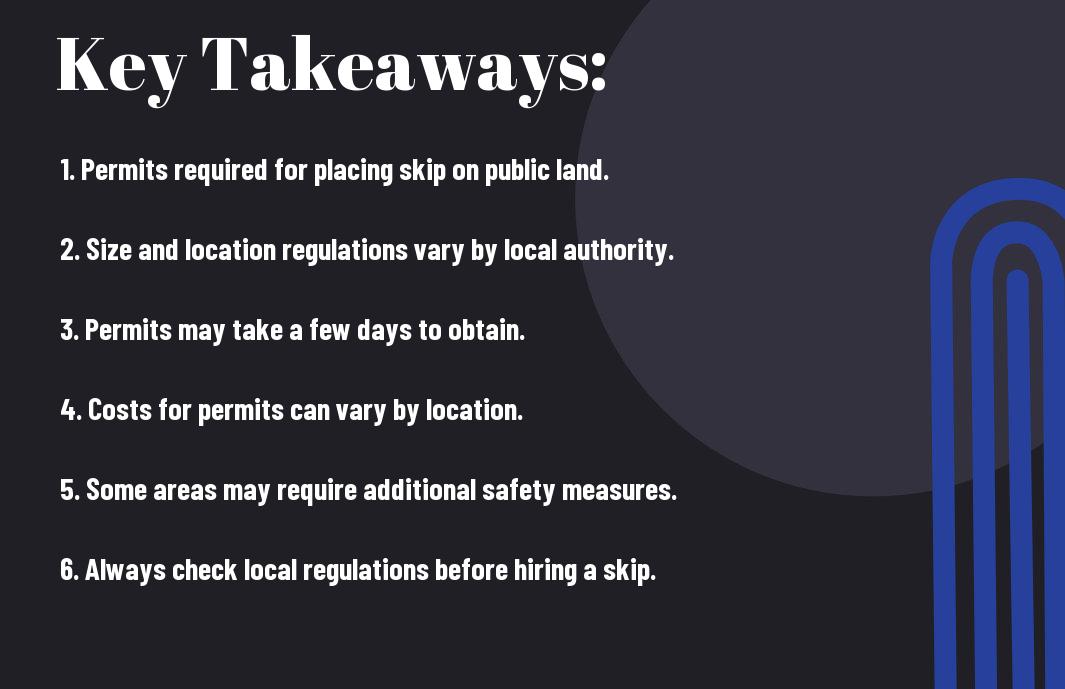Perplexed by the process of obtaining skip hire permits in the UK? Look no further. Whether you’re a homeowner embarking on a renovation project or a business owner tackling a construction site, understanding the regulations surrounding skip permits is crucial. Failure to comply with the permitting requirements can result in hefty fines and legal repercussions. In this informative blog post, we will delve into the intricacies of skip hire permits in the UK, exploring the legal obligations, safety considerations, and environmental responsibilities that come with hiring a skip. By the end of this article, you will have a comprehensive understanding of the permits necessary for skip hire in the UK, ensuring that you can proceed with your project confidently and lawfully.
Key Takeaways:
- Skip hire permits are required in the UK if you plan to place a skip on a public highway or pavement.
- The process of obtaining a permit involves contacting the local council or a permit management company, providing necessary documentation, and paying the required fees.
- Understanding the regulations surrounding skip hire permits is crucial to avoid potential fines and legal complications.


Skip Hire Regulations in the UK
When it comes to hiring a skip in the UK, there are several regulations that must be adhered to in order to ensure compliance with the law.
Permit Requirements
Before hiring a skip, it is important to be aware of the permit requirements. In most cases, if you plan to place the skip on a public road or pavement, you will need to obtain a permit from the local council. This is to ensure that the skip does not obstruct traffic flow or pose a hazard to pedestrians. It is essential to factor in the cost and time required to obtain a permit when planning skip hire.
Types of Skips and Associated Regulations
There are different types of skips available for hire, each with its own set of regulations. For example, larger skips may require additional permits and have specific placement restrictions. The size and type of skip will determine the regulations that apply, so it is important to choose the right skip for your needs while considering the associated regulations.
- Size and type of skip
- Permit and placement regulations
- Waste disposal regulations
- Environmental considerations
The regulations surrounding skip hire in the UK are in place to ensure public safety and environmental responsibility. It is crucial to understand and comply with these regulations to avoid fines or legal repercussions.
| Regulation Type | Associated Details |
|---|---|
| Size and type of skip | Determines permit requirements and placement restrictions |
| Permit and placement regulations | Defines where the skip can be placed and the need for permits |
| Waste disposal regulations | Outlines the proper disposal of waste and prohibited items |
| Environmental considerations | Highlights the need for eco-friendly waste management practices |
| Public safety measures | Ensures that skip placement does not pose a hazard to the public |
Applying for Skip Hire Permits
Anyone looking to hire a skip for their waste removal needs in the UK must apply for a skip hire permit if they plan to place the skip on a public highway or pavement. This is a legal requirement outlined in the Highways Act 1980, and failing to obtain the necessary permit can result in hefty fines and potential legal action. Understanding the process for applying for skip hire permits is crucial for both individuals and businesses.
Steps to Secure a Permit
Securing a skip hire permit involves several important steps. Firstly, you will need to determine whether you require a permit based on the location where the skip will be placed. Next, you will need to complete an application form and submit it to the local council or relevant authority. The application may require details such as the skip placement location, duration of the hire, and waste type.
Common Reasons for Permit Denial
There are several common reasons why skip hire permits may be denied. These include inadequate information provided in the application, the proposed location being unsuitable or hazardous, or failure to comply with local regulations and restrictions. It is vital to carefully consider these factors when applying for a permit to avoid potential delays or rejections.
Local councils and authorities take the safety and cleanliness of public spaces seriously, and any violations of regulations or failure to provide accurate information can lead to permit denial. It is essential to thoroughly review the requirements and guidelines before submitting an application to increase the chances of approval.
Placement and Usage Guidelines
Rules for Skip Placement on Private Property
When placing a skip on private property, it is important to ensure that the skip is placed on a sturdy surface such as concrete or tarmac. This will prevent any damage to the ground and ensure the skip is stable. It is also essential to obtain permission from the property owner before placing a skip on their land. Failure to do so may result in legal action and additional costs. Additionally, be mindful of any access restrictions or obstacles such as overhead cables or trees when positioning the skip.
Furthermore, it is crucial to consider the potential impact on neighbouring properties such as blocking access or causing disruption. It is advisable to notify neighbours in advance and address any concerns they may have. Following these rules will help avoid any unnecessary disputes and ensure the smooth placement of the skip on private property.
Rules for Skip Placement on Public Property
When placing a skip on public property, such as a roadside or footpath, it is necessary to obtain a permit from the local council. The skip must be positioned in a designated parking space and clearly marked with reflective tape or traffic cones to ensure visibility and safety. The skip provider will usually arrange the necessary permits, but it is the responsibility of the individual hiring the skip to ensure compliance with regulations.
Moreover, it is essential to consider the impact on pedestrian and vehicle traffic when siting a skip on public property. The skip should not obstruct pathways or impede the flow of traffic. Adhering to these rules is crucial for maintaining public safety and avoiding penalties for non-compliance.
It is worth noting that some local authorities may have specific guidelines or restrictions in place regarding skip placement on public property. It is advisable to check with the relevant council to ensure full compliance with local regulations.

Cost and Duration of Skip Hire Permits
When hiring a skip in the UK, it’s important to understand the cost and duration of skip hire permits. The specific cost and duration will vary depending on a number of factors, and it’s crucial to be aware of these in order to avoid any potential issues that may arise.
Factors Affecting Permit Cost
Several factors can affect the cost of a skip hire permit in the UK. The location of the skip, the size of the skip, and the duration of the permit are all key factors that can impact the overall cost. Additionally, the type of waste being disposed of may also influence the permit cost. It’s important to consider these factors carefully when obtaining a skip hire permit to ensure that you are aware of the potential cost implications. Knowing the specific requirements for your location and the type of waste you will be disposing of can help you determine the most accurate cost estimates.
Understanding Permit Validity Periods
Permits for skip hire in the UK have specific validity periods that must be adhered to. Understanding these validity periods is essential to avoid any potential legal issues. The validity period will depend on the specific regulations set by the local council or authority, and it’s important to be aware of these requirements before hiring a skip. Failure to comply with the validity period regulations can result in fines or other legal consequences.
It’s crucial to check with the local council or authority to determine the specific validity period for skip hire permits in your area. Being informed about the validity periods will ensure that you are in compliance with the necessary regulations and can avoid any potential penalties.
Understanding Skip Hire Permits in the UK
In conclusion, skip hire permits are a necessary requirement for anyone looking to hire a skip in the UK. Understanding the regulations and requirements surrounding skip hire permits is crucial for both individuals and businesses. By obtaining the necessary permits, you not only ensure compliance with the law, but you also contribute to responsible waste management and environmental protection. It is important to familiarise yourself with the specific requirements in your local area, as regulations can vary from council to council. Failure to comply with skip hire permit regulations can result in hefty fines and legal consequences. Therefore, it is essential to seek out the appropriate permits before placing a skip on public land. By staying informed and adhering to the necessary regulations, you can ensure a smooth and compliant skip hire process.
Understanding Skip Hire Permits in the UK
Q: What is a skip hire permit?
A: A skip hire permit is a legal requirement for placing a skip on a public road or pavement in the UK. It is issued by the local council and ensures that the skip meets safety and environmental standards.
Q: Do I need a skip hire permit for private property?
A: No, if the skip is placed entirely on private property, such as a driveway or garden, a permit is not required. However, if the skip will be on the public highway, a permit is necessary.
Q: How do I obtain a skip hire permit?
A: You can apply for a skip hire permit through your local council or a licensed skip hire company. The permit application process typically involves providing details of the placement location, skip size, and duration of hire.
Q: What is the cost of a skip hire permit?
A: The cost of a skip hire permit varies depending on the local council and the duration of the permit. It is important to factor in the permit cost when planning for skip hire to avoid any additional expenses.
Q: What happens if I place a skip without a permit?
A: Placing a skip on a public road without a permit is illegal and can result in fines or the removal of the skip. It is essential to obtain the necessary permit to avoid any legal repercussions.







